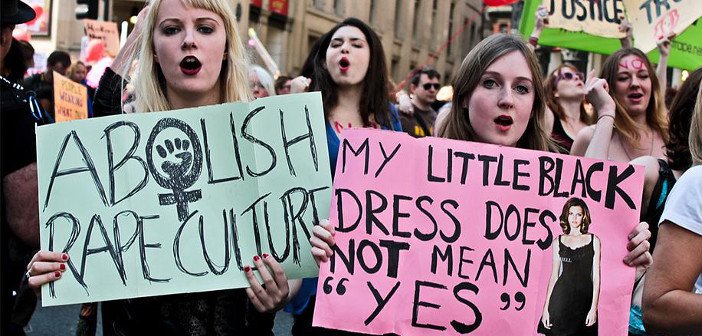Rape Culture: The Question of Blame
In 2012, Magnus Meyer Hustveit sent an email to his ex-girlfriend admitting to have raped her several times while she was sleeping. Hustveit gave detailed accounts of how he repeatedly used her “body for (his) gratification” during their relationship, and how he “convinced (himself) it was a victimless crime because (she was) asleep.” He also added that he hoped she would choose not to prosecute him for his crimes. This year, Hustveit pleaded guilty to one count of sexual assault and one count of rape. He was sentenced to seven years in prison, only to have that entire sentence suspended given the apparent “exceptional” nature of the case. On July 13th, Niamh Ní Dhomhnail watched her rapist walk free from the Central Criminal Court, thanks to the incredible notion that if Hustveit hadn’t come forward himself, there wouldn’t have been anyone to prosecute in the first place.

As expected, Ní Dhomhnail does not feel that justice has been served. And why should she? Not only had she been sexually violated by somebody that she (presumably) trusted, but she has also suffered consequential physical and mental problems since her attack(s). After the judge’s final verdict, she dismissed her right to anonymity, broke her silence, and stated that “…this case sends a clear message to Irish society that rape and sexual violence is not being taken seriously enough.”
And she’s right. What kind of world do we live in where a man is rewarded for admitting that he raped his girlfriend? If Hustveit murdered somebody would his sentence have been suspended? Would a little email confessing his sins have saved him then? Of course it wouldn’t – because murder (like rape) is a crime, and crimes deserve to be punished. Verdicts like these don’t come around too often, but when they do, they speak volumes about contemporary society’s attitudes towards rape and sexual abuse. It’s probably not unfair to say that the general population of the country were as equally offended, shocked, and repulsed by the Court’s decision… And rightly so. It was the first time in a very long time that the comments on every journal.ie article, Facebook post, and blog entry were unanimous – the justice system fucked up. This should not have happened. But it did.
In the 1970s, a few feminists in America coined the term ‘rape culture.’ They used it to describe the set of societal values and dominant ideologies that suggest that rape, and violence in general, is a typical response to the very existence of women. In her book Transforming Rape Culture, Emilie Buchwald offers a means of rejecting this notion, by proposing that rape actually isn’t an inevitability, and that “…much of what we accept (…) is in fact the expression of values and attitudes that can change.” We could look at the reaction to Hustveit’s suspended sentence and say – yeah, values and attitudes towards rape have changed. Nobody agrees with the judge’s decision. Nobody’s happy about the fact that a man can rape his girlfriend multiple times and walk away to live happily ever after.
 Similar mass outrage was exhibited last week, when it was reported that two young Indian women were sentenced to a gang rape in Uttar Pradesh, because their brother ran away with a woman of a higher caste. Although the sentence was handed down by an unofficial council of elders, and the two women have since fled the village, the use of rape as a punishment alongside the notion that these women are their brother’s property, has sparked global fury. And why shouldn’t it? We all know that innocent women should not punished for the actions of their male siblings. And we definitely know that rape or sexual violence of any kind should never be used as some sort of warped, disciplinary measure.
Similar mass outrage was exhibited last week, when it was reported that two young Indian women were sentenced to a gang rape in Uttar Pradesh, because their brother ran away with a woman of a higher caste. Although the sentence was handed down by an unofficial council of elders, and the two women have since fled the village, the use of rape as a punishment alongside the notion that these women are their brother’s property, has sparked global fury. And why shouldn’t it? We all know that innocent women should not punished for the actions of their male siblings. And we definitely know that rape or sexual violence of any kind should never be used as some sort of warped, disciplinary measure.
But according to people like Buchwald, and thousands of others around the world, combating rape culture is not just about the ability to discern that rape is bad… It’s about recognising the ways in which society implicitly normalises sexual violence against people of all genders, about rejecting any and all instances of victim blaming, and realising that rape does not ‘just happen.’
Canadian rape crisis centre, Women Against Violence Against Women, affiliates rape culture with things like rape jokes, slut shaming, ‘Keep Calm and Rape’ t-shirts, and society’s sexual objectification of women (and girls). A few weeks ago, a high school student from Kentucky was sent to the principal’s office for wearing an outfit that was deemed “distracting,” as it showed off her collar bones. The case gained mass media attention after the student’s mother created an online petition, demanding that Woodford County High change their ridiculous dress code. While the petition does not specify that the school’s code should be altered for suggesting that it is automatically someone else’s fault when a student’s attention is deferred, the dispute does tie in with this idea of slut shaming and victim blaming. How many times have women reported sexual assaults, only to be asked what they were doing, how they were acting, or what they were wearing? According the Rape Crisis Centre’s National Statistics in 2013, 43% of people who reported a rape to the Gardaí felt their report had been treated insensitively. 64% didn’t report their assault at all.

All of this isn’t to say that being punished because your collar bones are showing is the same as being sexually assaulted. It isn’t. At all. But if we’re working under the theory that we all live in a culture that has normalised rape, then the two must be connected. Surely, if we teach people not to rape, instead of teaching people how to not get raped, then the world would be a much safer place?
Some people aren’t so sure. For often failing to acknowledge male victims of rape, and assuming that all people are inherently ‘good,’ the rape culture paradigm has been heavily criticised. America’s leading anti-sexual violence network, RAINN, has questioned rape culture, claiming that its existence has been used as a scapegoat – or in some case, a justification – for rape. In a recommendation concerned with rape on college campuses, the group referenced research showing that 90% of reported college rapes were committed by 3% of the male college population.
While RAINN recognise the discernable impact that the normalisation of sexual abuse, victim blaming, and slut shaming have on the issue, they also believe that “rape is caused not by cultural factors but by the conscious decisions, of a small percentage of the community, to commit a violent crime.” By this logic, it would be wrong to blame society alone for the actions of somebody like Hustveit, or the decisions made by the village elders in Uttar Pradesh. They made the decision to rape, or to use rape as punishment, and therefore the blame lies with them. They should be prosecuted. But would it not also be wrong to assume that the eradication of one man – or one group of men – is the key to solving society’s attitudes towards sexual abuse? Their actions were repulsive, their choices life destroying, but these incidents were not isolated – not in India, not in Ireland… Not anywhere.
I believe that rape culture exists. I also believe that within rape culture, people who are determined to break the law, commit horrendous acts of sexual violence, and ruin lives also exist. Those two things are not exclusive, but they may not be exactly the same either. Pop songs, offensive jokes, and objectification all play some part in normalising sexual abuse, but so does the individual who decides to rape, and so does the judge who decides to suspend his sentence.
Maybe the next time a woman wears a low cut shirt, she shouldn’t be told to “cover up” lest she is somehow asking to be attacked. And maybe the next time somebody rapes their partner while they sleep, the Central Criminal Court should actually prosecute them. Perhaps that would be a good place to start.
Images via nationalreview.com
brownpoliticalreview.org
Stacie Dunn
thejournal.ie
